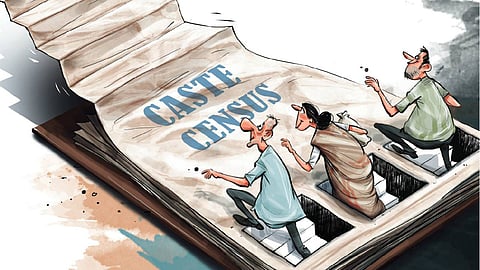

The State Government’s contentious caste survey report, which was showing signs of triggering a political storm, is now likely to be put on the back-burner after the Union Government’s announcement of the caste census along with the national population census.
However, the tug-of-war over the issue of caste census will continue or might escalate at the state and national levels over the next few months. As Congress attempts to set an agenda for the Centre, the BJP, which was on the defensive, will storm into the issue with confidence.
For Congress and its government in Karnataka, the Centre’s announcement provided a breather to reassess the entire issue and fine-tune their strategy, given the differences within the party and even among the ministers over the decade-old survey report. Also, it faces the risk of antagonising dominant communities opposing the survey report.
Those privy to the developments in the state government believe that the report is likely to be shelved for at least a few months for the government to wait and watch the Centre’s next move before deciding on the next course of action. A special cabinet meeting to exclusively discuss the state caste census report was not held on May 2, as contemplated earlier. The ministers may discuss it in the next cabinet meeting on May 9, in view of the Union Government’s announcement.
There are several concerns over the state’s report prepared based on the data collected in 2015. The dominant Vokkaliga and Veerashaiva-Lingayat communities question the report’s sanctity and credibility. Their main grievance is that their community numbers were under-counted. Those with the All-India Veerashaiva Mahasabha, opposing the state’s caste census, say that a population census conducted by the Union Government will be more credible and all communities will accept it.
Now, the Centre’s announcement has lent more credence to those opposing the state report by terming it outdated. Some ministers even admit that a lot of changes have taken place in the decade since the data was collected. Also, if the figures of the state survey report and the Centre’s census do not match, there will be a problem. These aspects need to be factored in before making the next move.
The state government may use parts of the survey findings in policy-making. However, it is unlikely to go ahead with officially releasing the full data or the caste numbers, although parts of the report have already made it to the media. These numbers may come in handy for the CM and other leaders to further consolidate their positions within the party.
On the political front, Congress leaders’ statements over the last few days show that they are claiming credit for the Centre’s policy decision, trying to take a moral high ground on the issue.
They’re seeking to set the agenda by urging the Centre to include socioeconomic and educational aspects in the census.
Congress is attempting to dominate the narrative on the caste census.
While the Congress would urge the Centre to follow its template, the BJP believes it has taken the wind out of Congress’ sails. In a way, BJP has disarmed Congress, which was aggressively pursuing the caste census issue at the national level led by Leader of Opposition in the Lok Sabha Rahul Gandhi.
As politics over the caste census rages on, it is ironic that a large number of deserving candidates are being deprived of the benefit of reservation due to enormous vacancies in the state government. It defeats the purpose of social justice and affirmative action as the government is the sole provider of reservation in employment.
During a debate in the Assembly in April 2021, Law Minister HK Patil, who was then in the opposition, had aptly stated that over 2.5 lakh government posts, or around 45% of the total posts, were vacant since 2004-2005. By keeping those posts vacant, one generation was deprived of the benefit of reservation. If other government entities and PSUs are included, the total vacancies would be around 4 lakh. “We all need to introspect,” Patil had told the Assembly during that debate then.
Perhaps, not much has changed since then. Now, Congress is in power and Siddaramaiah, who was then the Opposition Leader in the Assembly, is the chief minister. It’s time those in power introspect. The commitment to social justice should not just remain a rhetoric, but translate into action.